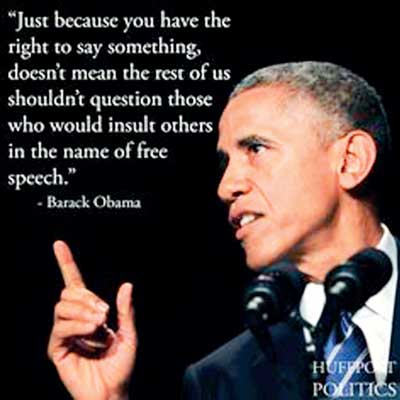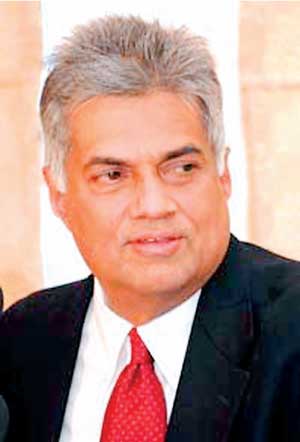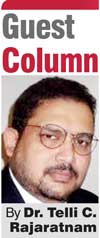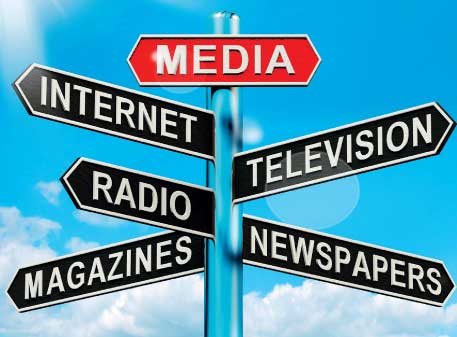Monday Feb 16, 2026
Monday Feb 16, 2026
Thursday, 11 February 2016 00:14 - - {{hitsCtrl.values.hits}}
 Governance of the media
Governance of the media
If we affirm that independence and pluralism in the media are in fact preconditions for democracy to flourish, it is possible for key elements in government to be committed to media that do not simply repeat what they would like to hear. A positive relationship between the state and media goes beyond pure laissez-faire to nourishing an independent and pluralistic mediascape.
A current issue in many countries is the monopolisation of media by powerful interests, whether private or public, which lessens the plurality of voices in the public sphere. Perhaps the most important expression of an open relationship between media and the government is the airing of unpopular viewpoints that may reflect tensions in the society. If the mediascape is not open and pluralistic, these viewpoints may leave the democratic sphere and foment violence.
Governance of the media also includes the dimension of governance among the different sectors and interests present in the media themselves. The implementation of a legal and regulatory environment that encourages freedom and pluralism in public information is often facilitated when governments and professional associations have access to comparative examples of media legislation, codes, and cooperation strategies for media development.
Associations dedicated to media accountability such as ombudsmen and press councils also have a key role to play in the governance of media. One important role they play is in encouraging discussion within the media sector about ethical practices and their professional responsibilities. They can thereby strengthen the media’s internal professional standards and increase public confidence in the reliability of the information provided.
In countries with emerging independent mediascapes, professional media industry associations can take the lead in assisting various media outlets to understand their role as independent media and encourage them to find ways to be economically self-sustaining. This should include both media as well as information services such as news agencies, community-based radio, web-based distribution and media production networks. Considering the smaller number of women in the media in most societies and the special situations they may face, professional associations should actively encourage training for women and greater gender equity within the profession. 
These associations should also promote training among media professionals and broad education for those who wish to enter the profession. Such training should emphasise the values of independence, professional ethics, gender equity and the role of media in democratic societies. Such associations can sponsor debates that touch at the heart of the particular circumstances and challenges confronting the media in particular societies, while opening up wider discussions about the relationship between governance and media in the region and in the global context.
The role of the media in promoting good governance is clear. All aspects of good governance are facilitated by a strong and independent mediascape within a society. Only when journalists are free to monitor, investigate and criticise the public administration’s policies and actions can good governance take hold. Independent media are like a beacon that should be welcomed when there is nothing to hide and much to improve. Indeed, this is the concrete link between the functioning of the media and good governance—the media allow for ongoing checks and assessments by the population of the activities of government and assist in bringing public concerns and voices into the open by providing a platform for discussion. Instead, all too often governments devise laws and informal means of keeping their activities hidden from public view or only available to media favourable to their viewpoint.
The necessity to regulate the media
Private media freedom is running amok. The news that millions of people in this country including foreign correspondents who convey news overseas receive each night is determined by a handful of men responsible only for their corporate employers. The State should have control not to permit abuse of the freedom of the press.
Some corporate employers create a monopoly to cow and terrorise their victims and it is trite learning that some politicians are on their payroll and one such politician who is known to change his loyalty to successive leaders has even employed media secretary who is drawing a government salary and is on the payroll of the corporate master who looks after both the media secretary and the Politician who exploits every syllable of the law having dusted the shoes of a former leader to obtain a silky level.
In such circumstances bribery and corruption is rampant and desecrates the very norms of justice and good governance having commenced in the hills and gradually to various parties and now in the colour of the skies. When such corrupt menace to society is pampered by a corporate pillar, it affects the very norms of good governance. Sometimes they could be termed manipulators or name droppers with scant regard to morals and dignity.
The observations made by Prime Minister Ranil Wickremesinghe are absolutely analytical and factually correct. The media has to be regulated. Journalist should act with responsibility for good governance.
Quality of the language
Words are known as the vehicle of thought. Unfortunately, daily newspapers, electronic media and some weekend newspapers have been reported to be of poor standard where errors in English are seen. Mischievous reporting to is a vital ingredient to satisfy the corporate masters to create dissention and conflict.
Origin of media
The word media comes from the Latin plural of medium. The traditional view is that it should therefore be treated as a plural noun in all its senses in English and be used with a plural rather than a singular verb: the media have not followed the reports (rather than ‘has’). In practice, in the sense ‘television, radio, and the press collectively’, it behaves as a collective noun (like staff or clergy, for example), which means that it is now acceptable in standard English for it to take either a singular or a plural verb. The term Media  emanates from the word Medium (the plural of medium), the word medium is defined as “one of the means or channels of general communication, information, or entertainment in society, as newspapers, radio, or television”.
emanates from the word Medium (the plural of medium), the word medium is defined as “one of the means or channels of general communication, information, or entertainment in society, as newspapers, radio, or television”.
The Hutchins Commission (whose official name was the Commission on Freedom of the Press) was formed during World War II, when Henry Luce (publisher of Time and Life magazines) asked Robert Hutchins (president of the University of Chicago) to recruit a commission to inquire into the proper function of the media in a modern democracy. The Commission was established as a response to criticism from the public and government over media ownership.
As the Commission chair, Hutchins had the duty of selecting members for the Commission, although he ran his picks by Henry Luce first. The final commission was made up of twelve prominent intellectuals, all white upper-class men. Although all members were respected intellectuals with sterling reputations, none of them were journalists. Hutchins was of the opinion that the commission would be more open-minded if it contained no journalists, but enemies of the Commission, particularly in the press, used this fact to attack the credentials of the Commission.
After deliberating for four years, the Commission came to this conclusion in 1947: the press plays an important role in the development and stability of modern society and, as such, it is imperative that a commitment of social responsibility be imposed on mass media. According to this social responsibility theory, the press has a moral obligation to consider the overall needs of society when making journalistic decisions in order to produce the greatest good. Though there had been journalism “codes of ethics” for decades, the Commission’s report was considered landmark by some scholars; they believed it was a pivotal reassertion of modern media’s role in a democratic society.
Social-responsibility theory
Social-responsibility theory was born at a time (just after Franklin Roosevelt’s death) when large and powerful publishers were unpopular with the public, and when the public had a high degree of suspicions about the motivations and objectives of the press. The press had mushroomed into an unwieldy and powerful entity, and criticism of the Fourth Estate was widespread. Critics contended that the media had monopolistic tendencies, that corporate owners were not concerned with the rights or interests of those unlike themselves, and that commercialisation produced a debased culture as well as dangerously selfish politics.
Social-responsibility theory thus proposes that the media take it upon themselves to elevate society’s standards, providing citizens with the information they need to govern themselves. It is in the best interest of the media to do this; if they do not, social theorists warn, the public will demand that the government regulate the media.
Some scholars (among them John C. Nerone) have speculated whether journalistic fairness and balance already existed prior to the Commission’s report. Were the Commission’s conclusions merely an “adjustment” in liberalism, brought on by perceived business demands? Libertarians (who prioritise individual liberty and seek to minimise the power of the state) are wary of the social-responsibility theory; they believe that responsibility means accountability, accountability means government intervention, and government intervention comes at the expense of liberty. Indeed, the Commission noted that continued misuse of press power would necessitate regulation.
The code of ethics in media was created by a suggestion from the 1947 Hutchins Commission. They suggested that newspapers, broadcasters and journalists had started to become more responsible for journalism and thought they should be held accountable. The guidelines were set up around two important ideas. The first guideline is that whoever enjoys a special measure of freedom, like a professional journalist, has an obligation to society to use their freedoms and powers responsibly. This guideline is useful so that people in power are able to be held liable in case their actions are not professional.
People that have high media attention should not abuse the power. The second guideline that was established is society’s welfare is paramount, more important than individual careers or even individual rights. Again, holding people responsible for their actions and stating that society is more important due to the vast number of people that could be affected by poor behaviour. The Hutchins Commission added another five guidelines specifically for the press.
Neutral viewpoint
All of these guidelines are important because the press is required to maintain a neutral viewpoint, providing the basic facts and allowing for readers to come up with their own opinions from the news that they report. These guidelines inspired Society of Professional Journalists which is the current version of media ethics that were adopted in 1996. The Society of Professional Journalists created a code of ethics that are in effect today. The main mantra of the code is:
Seek truth and report it!; Journalists should be honest, fair, and courageous in gathering, reporting, and interpreting information. Journalists should; Test the accuracy of information from all sources and exercise care to avoid inadvertent error. Deliberate distortion is never permissible; Diligently seek out subjects of news stories to give them the opportunity to respond to allegations of wrongdoing; Identify sources whenever feasible. The public is entitled to as much information as possible on sources’ reliability; Always question sources’ motives before promising anonymity. Clarify conditions attached to any promis made in exchange for information. Keep promises; Make certain that headlines, news teases, and promotional material, photos, video, audio, graphics, sound bites, and quotations do not misrepresent. They should not oversimplify or highlight incidents out of context; Never distort the content of news photos or video. Image enhancement for technical clarity is always permissible. Label montages and photo illustrations; Avoid misleading re-enactments or staged news events. If re-enactment is necessary to tell a story, label it; Avoid undercover or other surreptitious methods of gathering information except when traditional open methods will not yield information vital to the public. Use of such methods should be explained as part of the story; Never plagiarise; Tell the story of the diversity and magnitude of the human experience boldly, even, when it is unpopular to do so; their own cultural values and avoid imposing on those values on others; Avoid stereotyping by race, Examine gender, age, religion, ethnicity, geography, sexual orientation, disability, physical appearance, or social status; Support the open exchange of views, even views they find repugnant; Give voice to the voiceless; official and unofficial sources of information can be equally valid; Distinguish between advocacy and news reporting. Analysis and commentary should be labelled and not misrepresent fact or content; Distinguish news from advertising, and shun hybrids that blur the lines between the two; Recognise and special obligation to ensure that the public’s business is conducted in the open and that government records are open to inspection; Minimise Harm; Ethical journalists treat sources, subjects, and colleagues as human beings deserving of respect. Journalists should; Show compassion for those who may be affected adversely by news coverage. Use special sensitivity when dealing with children and inexperienced sources or subjects; Be sensitive when seeking or using interviews or photographs of those affected by tragedy or guilt; Recognise that gathering and reporting information may cause harm or discomfort. Pursuit of the news is not a license for arrogance; Recognise that private people have a greater right to control  information about themselves that do public officials and others who seek power, influence, or attention. Only an overriding public need can justify intrusion into anyone’s privacy; Show good taste. Avoid pandering to lurid curiosity; Be cautions of identifying juvenile suspects or victims of sex crimes; Be judicious about naming criminal suspects before the formal filing of charges; Balance a criminal suspect’s fair trial rights with the public’s right to be informed; Act Independently Journalists should be free of obligation to any interest other than the public’s right to know. Journalists should ; Avoid conflict of interest, real or perceived; Remain free of associations and activities that may compromise integrity or damage credibility; Refuse gifts, favours, fees, free travel, and special treatment, and shun secondary employment, political involvement, public office, and service in community organisations if they compromise journalistic integrity; Disclose unavoidable conflicts; Be vigilant and courageous about holding those with power accountable; Deny favoured treatment to advertisers and special interests and resist their pressure to influence news coverage; Be wary of sources offering information for favours or money; avoid bidding for news; Be Accountable; Journalists are accountable to their readers, listeners, viewers, and each other. Journalists should Clarify and explain news coverage and invite dialogue with the public over journalistic conduct; Encourage the public to voice grievances against the news media; Admit mistakes and correct them promptly; Expose unethical practices of journalists and the news; Abide by the same high standards to which they hold others (Straubhaar, LaRose & Davenport, Pg 475-479).
information about themselves that do public officials and others who seek power, influence, or attention. Only an overriding public need can justify intrusion into anyone’s privacy; Show good taste. Avoid pandering to lurid curiosity; Be cautions of identifying juvenile suspects or victims of sex crimes; Be judicious about naming criminal suspects before the formal filing of charges; Balance a criminal suspect’s fair trial rights with the public’s right to be informed; Act Independently Journalists should be free of obligation to any interest other than the public’s right to know. Journalists should ; Avoid conflict of interest, real or perceived; Remain free of associations and activities that may compromise integrity or damage credibility; Refuse gifts, favours, fees, free travel, and special treatment, and shun secondary employment, political involvement, public office, and service in community organisations if they compromise journalistic integrity; Disclose unavoidable conflicts; Be vigilant and courageous about holding those with power accountable; Deny favoured treatment to advertisers and special interests and resist their pressure to influence news coverage; Be wary of sources offering information for favours or money; avoid bidding for news; Be Accountable; Journalists are accountable to their readers, listeners, viewers, and each other. Journalists should Clarify and explain news coverage and invite dialogue with the public over journalistic conduct; Encourage the public to voice grievances against the news media; Admit mistakes and correct them promptly; Expose unethical practices of journalists and the news; Abide by the same high standards to which they hold others (Straubhaar, LaRose & Davenport, Pg 475-479).
Freedom of expression
Protecting freedom of expression from abridgment by any law, guarantees to the people through their press a constitutional right, and thereby places on newspaper people a particular responsibility. Thus journalism demands of its practitioners not only industry and knowledge but also the pursuit of a standard of integrity proportionate to the journalist’s singular obligation.
(The writer can be reached via email [email protected], Facebook facebook.com/Dr.T.C.Rajaratnam or mobile 0777907799.)